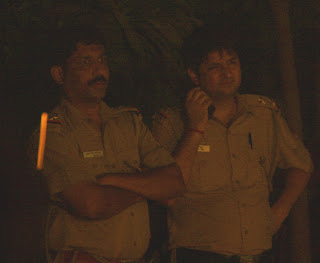
I. The Metro
 Construction workers at the Lajpat Nagar Metro stop, to be opened in 2010.
Construction workers at the Lajpat Nagar Metro stop, to be opened in 2010. A modern take on traditional, caste-based division of labor (in many places different colored turbans mark your caste) -- different colored helmets mark your place in the metro laborer hierarchy. (Purple helmet - engineer; orange - supervisor guards; red - electrician; and at the bottom are the all-around workers).
A modern take on traditional, caste-based division of labor (in many places different colored turbans mark your caste) -- different colored helmets mark your place in the metro laborer hierarchy. (Purple helmet - engineer; orange - supervisor guards; red - electrician; and at the bottom are the all-around workers).Built with cutting edge technology from around the world and partly funded by a large loan from the Japan Bank for International Corporation (JBIC), the Delhi Metro, opened in 2002, is an avatar of India's future. It's sleek, safe, clean, and colorless; it glides like a silver bullet over and under one of the most congested cities in the world without so much as a whisper. It is a haven of modernity, where things like eve-teasing and mechanical failures are no longer a problem, and where announcements reminding people not to travel on the roof, sit on the floor, or play loud music maintain proper decorum. The Delhi Metro Rail Corporation (DMRC) has painted large, socialist-realist-esque murals in its stations, depicting female metro employees sitting confidently in front large switchboards, happy commuters emerging from glossy escalators and the larger-than-life metro itself, a symbol of India's unstoppable progress. First time escalator riders -- often women from nearby villages -- giggle and shriek as they jump on this strange, wonderful machine. According to the DMRC website, "spiritualism is a guiding force at DMRC," and Delhi Metro employees are given copies of the Bhagavad Gita upon joining the metro. They begin their workday by reciting devotional prayers from the Gita. Prayers like this: When you are inspired by some great purpose [...] all your thoughts break their bonds; your mind transcends limitations...The Delhi Metro already has a museum full of statistics and fun facts about its construction. But the construction of the metro has also displaced many people, and, unlike public transportation systems in most Western countries, it is mostly used by middle and upper-class Delhi residents. An auto rickshaw driver recently told me what he thought of the metro. "Too risky, too dangerous," he said.
 Environmental Safety Oath.
Environmental Safety Oath. A makeshift home built from the large, metal placards advertising the construction of the metro.
A makeshift home built from the large, metal placards advertising the construction of the metro.II. India's International Trade Fair
 All of the the newest gadgets were exhibited at the International Trade Fair. A man enjoys a motorized foot massage at the "Czar Lifestyles International" company booth.
All of the the newest gadgets were exhibited at the International Trade Fair. A man enjoys a motorized foot massage at the "Czar Lifestyles International" company booth.


 The branch of the government responsible for power and electricity, "The Ministry of Power," exhibits an elaborate theme-park-esque vision of the future in which all, from the the very poor to the very rich, will be "empowered."
The branch of the government responsible for power and electricity, "The Ministry of Power," exhibits an elaborate theme-park-esque vision of the future in which all, from the the very poor to the very rich, will be "empowered."
III. Caste

Jitendra Makwana's (middle) father, a member of the Dalit sub-caste Chamar, skinned animals for a living. Now, his 23-year-old son manages a plastics company in Gujurat and is pursuing an MBA. The company hires 99% Dalits, most of whom are women and live in Makwana's community. A self-proclaimed athiest, Makwana is vehemently opposed to Hindu religion, which he sees as the root of caste discrimination. "You shouldn't blame God for your problems," he says, adding: "God is anti-scientific." Does he think the rise of technology and businesses will erase India's culture (i.e. village life, family values, religion)? "If Indian culture is getting lost, that's fine," Makwana says. But while his father shares his views, his mother, who is illiterate, is still a staunch Hindu. For Makwana, the internet, Google and English are great things because they are caste-neutral. "Google is the biggest democracy. When you're on Google, no one knows who you are," he proclaims.
IV. Gurgaon
After a wave of multinational companies decided to locate their call centers in this former undeveloped farmland, Gurgaon, a city just outside of Delhi, is now one of India's most developed and modern cities. It is a futuristic phantom city of Sim City Archology-like buildings, of large indoor malls and intimidating glass high-rises with addresses like "Infinity Tower, Sector 2, Phase 5" and "Dream Condominiums." There's no where to walk; and one rarely sees people in the open -- instead they move between the closed spaces of their cars, the mall and their offices. It's a nightmare.
 All norms are broken at the Ambience Mall, one of Asia's largest malls with 1 km of shopping on every floor.
All norms are broken at the Ambience Mall, one of Asia's largest malls with 1 km of shopping on every floor.





















